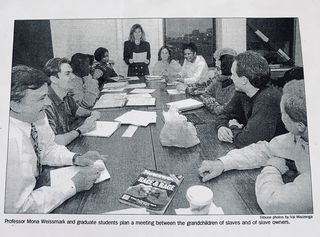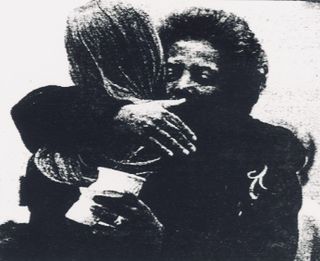Bias
Are There Any Solutions to Group Polarization?
Why outlawing bias fails. Studies show the need to redress injustices.
Posted May 8, 2018
Martin Luther King, Jr. had a dream that one day on the red hills of Georgia, the sons of former slaves and the sons of former slave owners would be able to sit down together at the table of brotherhood.

My graduate students and I made Martin Luther King’s dream a reality.
The year was 1995. We organized the first joint meeting between descendants of enslaved people and descendants of slave owners.
Twenty people — half of them descendants of enslaved people, the rest descendants of slave holders — met around a seminar table at a university in Chicago for four-days of facilitated discussions. They all had to agree to be closeted for six hours a day in a seminar room for intense facilitated discussions of slavery, race, guilt, resentment, injustice, forgiveness, and reconciliation

Melita Garza a journalist at the time with the Chicago Tribune reported on the meeting and published a cover story in the Chicago Tribune Tempo Section (June 2, 1995) titled ‘Lancing the Past.’ The photo accompanying the story showed the participants sitting in a circle with the caption “descendants of slave and slave owners meet in a conference room … as a way of finding common ground.”
Another photo in the Chicago Tribune article showed a black woman, a descendant of slaves, hugging a white woman, a descendant of slave owners after the four–day session.
Also, the UK journalist Veronique Mistiaen reported on the meeting and published a story in She Magazine (October, 1995) titled Slaves to the Past and the photos also showed the participants hugging and embracing each other.
Mistiaen concluded her story by stating "If the descendants of victims and victimisers were able to leave most of their anger,fear and mistrust behind and take back to their lives understanding and compassion, perhaps other polarized groups elsewhere in the world could attempt the same?"
What happened during those four days that made it possible for the participants to leave behind their past feelings?
The joint facilitated sessions depolarized the groups and helped redress injustices. The participants had learned the history behind their feelings and those facts changed the way the saw each other. Not by blaming and shaming. Not by outlawing bias. Not by mandatory politically correct slogans.
Rather, by facilitated conversations using the dialectic method. This is the method used in science and problem-solving education. It is a dialectical between people holding different points of view and deeply felt emotions about a subject but wishing to understand the other and test their views.
Throughout the world, and over the arc of time, hatred and resentment have been passed from generation to generation. For most of us, our desire for justice is deeply shaped by our emotions. Forgiveness and a sense of reconciliation with those who we feel have harmed us, our families, and our communities can be difficult to achieve.
It is, however, possible.
We know this both from our personal experiences and from research in the social sciences completed over the past 20 years. In studies I conducted at Harvard with children of Holocaust victims and children of Nazi SS guards, reconciliation was achieved (‘Second Generations Try to Heal Wounds From World War II’, the New York Times, cover story of the Connecticut Weekly Section, June 13,1993).
And these findings were later replicated with the descendants of enslaved people and slave owners in Chicago.
Not surprisingly, in the face of unjust treatment, the natural response is resentment and deep anger. In most cases, individuals experience an all but overwhelming desire for revenge for retribution. While legal systems offer a structural means for redressing injustice, they do not address the very real emotional and psychological pain that individuals feel.
It is this pain, which is passed from generation to generation – leading to entrenched racial and ethnic tension and group conflict. This emotional pain is unlikely to be solved simply by the recognition of historic grievances, by convening a national discussion on race, or by gestures of atonement.
Absent a true and open conversation addressing the anger, resentment, and sense of injustice felt by all involved, the psychological pain that flows from an unjust past cannot be resolved.
Indeed, social science research suggests that simple discussions of polarizing topics can actually increase polarization. Inasmuch as we all tend to discuss our thoughts and feelings about these events with friends and families—individuals who, more often than not, share our views—our belief in the correctness of our views is strengthened and our emotional responses grow stronger.
A more constructive approach involves the dialectic method an open and honest exchange of sentiments, opinions, and ideas with “the other”; the individuals we feel are responsible for our pain. We need to understand and work to assuage each other’s emotional pain. As noted, reconciliation is possible.
The children of Holocaust victims came to understand and became friends with the children of SS guards; the descendants of slaves can forgive the children of slave owners.
The term ‘justice’ derives from the Latin is meaning, “right in the sense of joining.” In its truest sense, justice implies joining in mutual conversation. Martin Luther King, Jr had a dream of this mutual conversation taking place at the table of humanhood.
Watch Coming to the Table (Pt. 1 & Pt. 2) as a group of descendants of enslaved people and slave owners reconcile at the table of humanhood.
Copyright © Mona Sue Weissmark All Rights Reserved
References
Weissmark, M. (forthcoming). The Science of Diversity. Oxford University Press, USA.
Weissmark, M. (2004). Justice Matters: Legacies of the Holocaust and World War II. Oxford University Press, USA.
Weissmark, M. & Giacomo, D. (1998). Doing Psychotherapy Effectively. University of Chicago Press, USA.




